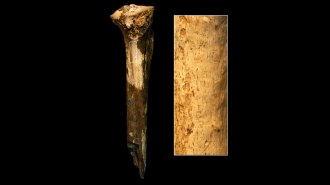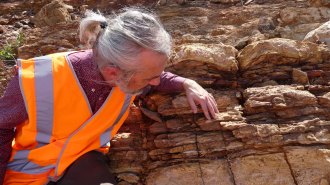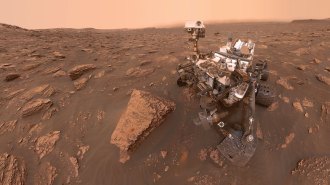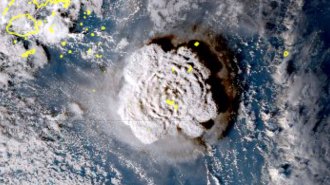Search Results for:
Skip to resultsCan’t find what you’re looking for? Visit our FAQ page.
112,972+ results for:
-
 Physics
PhysicsJulian Muñoz has a ‘ruler’ that could size up the early universe
The measurement tool could lay out a distance scale for cosmic dawn —and offer clues to the nature of dark matter.
-
 Animals
AnimalsBottlenose dolphin moms use baby talk with their calves
When their babies are near, bottlenose dolphin moms modify their signature whistles, similar to human parents speaking in baby talk.
-
 Anthropology
AnthropologyFossil marks suggest hominids butchered one another around 1.45 million years ago
Researchers disagree whether new evidence of stone tool marks on a hominid leg bone reflects ancient cannibalism or perhaps some other, undetected behavior.
By Bruce Bower -

-
 Astronomy
Astronomy50 years ago, a search for proof that the Maya tracked comets came up short
The mystery of whether the ancient civilization tracked comets endures, but recent evidence hints the Maya tracked related meteor showers.
-

-
 Life
Life1.6-billion-year-old steroid fossils hint at a lost world of microbial life
Molecular fossils suggest the existence of a lost world of primitive eukaryotes that dominated aquatic ecosystems from at least 1.6 billion to 0.8 billion years ago.
By Soumya Sagar -
 Astronomy
AstronomyA star cluster in the Milky Way appears to be as old as the universe
Globular cluster M92 is about 13.8 billion years old, a new calculation suggests. Getting the age right could help resolve a bigger cosmic conundrum.
-
 Earth
EarthIrrigation may be shifting Earth’s rotational axis
Computer simulations suggest that from 1993 to 2010 irrigation alone could have nudged the North Pole by about 78 centimeters.
By Sid Perkins -
 Genetics
GeneticsThe first gene therapy for muscular dystrophy has been approved for some kids
The U.S. Food and Drug Administration cleared a shortened version of a gene for a muscle protein to be used in 4- and 5-year-olds with muscular dystrophy.
-
 Astronomy
Astronomy‘Under Alien Skies’ imagines what the sky looks like on other planets
Astronomer Philip Plait’s new book takes readers on a thrilling ride to Mars, Pluto and even a black hole.
-

The Hunga Tonga eruption sparked the highest-altitude lightning ever recorded
The plume from the 2022 eruption spawned flashes of lightning that started 20 to 30 kilometers above sea level.
By Skyler Ware